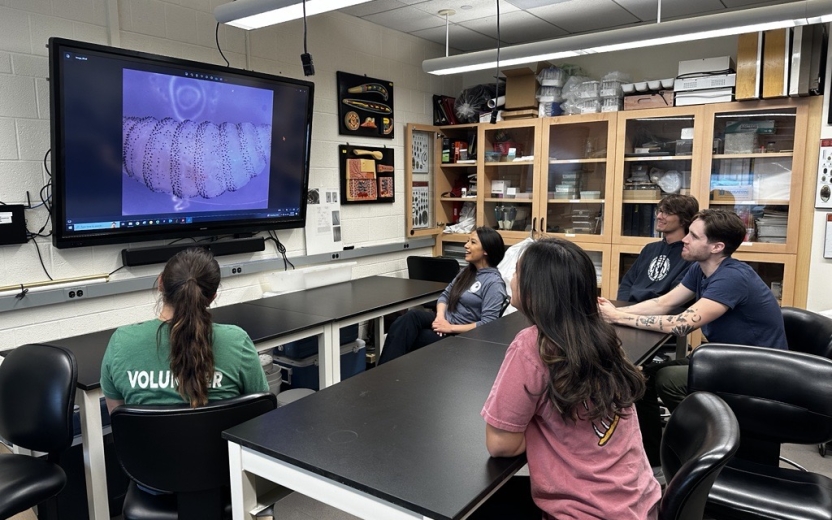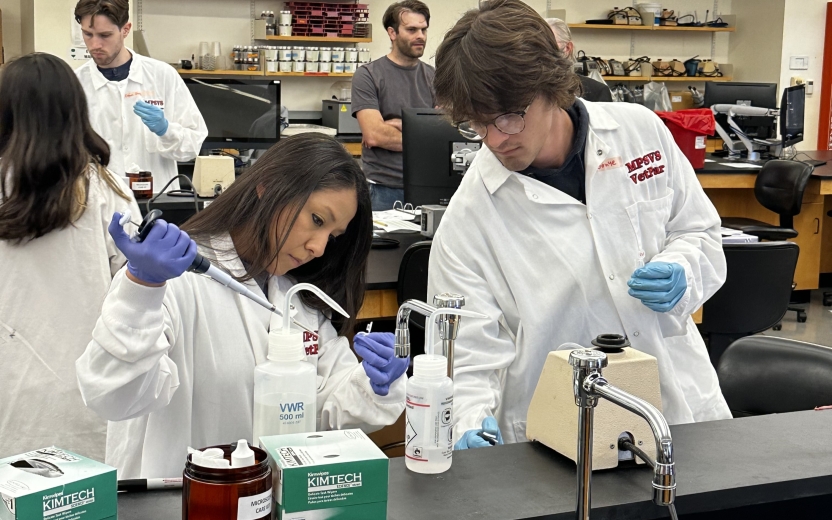Curriculum
Curriculum Requirements
To complete the program in 1 calendar year, students must earn a minimum of 12 credit hours each semester (fall, spring, and summer) for a total of 36 credits. This includes core coursework, 2 comprehensive in-person laboratory sessions, and elective courses. Students may also choose to pursue their studies at a more moderate pace to accommodate other professional and personal commitments. For additional details, read our program handbook.
Core Courses
| Courses | Credits |
|---|---|
| Parasites of Domestic Animals | 4 |
| Veterinary Pharmacology and Antiparasitic Agents | 2 |
| Parasite Diagnostic Methods | 2 |
| The U.S. Government and Animal Health | 1 |
| Scholarly Writing and Critical Review of Scientific Literature | 2 |
| Parasitology Seminar | 1 |
| Capstone I (Taken in the penultimate semester) | 2 |
| Capstone II (Taken in the final semester) | 4 |
| Total Credits (18 core credits required) | 18 |
Elective Courses
| Courses | Credits |
|---|---|
| Veterinary Ectoparasites and Vectors | 3 |
| Clinical and Applied Parasitology: Dogs and Cats | 3 |
| Clinical and Applied Parasitology: Cattle and Sheep | 3 |
| Parasitism in Wildlife and Zoo Animals | 2 |
| Drug Discovery and Vaccines: The Process and Parasiticides | 2 |
| Statistics for Surveillance, Diagnostic Test Development and Efficacy Studies | 2 |
| Product Development, Regulations and Approval Process | 2 |
| Clinical Parasitology Cases: Companion and Laboratory Animals | 1 |
| Clinical Parasitology Cases: Production Animals | 1 |
| Anthelmintic Resistance and Integrated Parasite Control | 2 |
| Parasites Without Boundaries | 2 |
| Histopathologic Interpretation of Parasites in Host Tissue (Online synchronous) | 1 |
| Total Credits (14 elective credits required) | 24 |
Laboratory Instruction
Students must take 4 credits of laboratory instruction (including a 1-credit online lab skills assessment after completing both in-person sessions).
In their final semester, students will be required to complete a literature review-based capstone project with guidance from program faculty.
Lab Courses
| Courses | Credits |
|---|---|
| Parasite Identification Methods (In-person, 1-week duration, lab) | 1.5 |
| Applied Parasite Identification and Diagnosis (In-person, 1-week duration, lab) | 1.5 |
| Parasitology Identification and Diagnostics: Skills Assessment | 1 |
| Total Credits (4 lab credits required) | 4 |
Concentration Tracks
Students have the option to take one of three concentration tracks: Clinical, Research or Conservation Parasitology. These curated 9-credit tracks will narrow the focus of their learning and allow them to gain an enhanced understanding of their chosen area in parasitology and count toward the total 14 elective credits required. Concentrations are not mandatory. If desired, students must declare their concentration in their first semester.
| Clinical Parasitology |
|---|
| VETMI 7423 OR 7424 Clinical cases production animal OR Companion & Laboratory animals (1 cr.) |
| VETMI 7448 Parasite ID in Histologic Sections Laboratory (1 cr.) |
| VETMI 7432 Resistance and Integrated Parasite Control (2 cr.) |
| VETMI 7459 OR 7460 Internal Parasites of Dogs and Cats OR Internal Parasites of Cattle and Sheep (3 cr.) |
| VETMI 7461 Parasites Without Boundaries (2 cr.) |
| Research Parasitology |
|---|
| VETMI 7458 Early Drug Discovery and Vaccine Development (2 cr.) |
| VETMI 7434 Regulatory Studies & Approval (2 cr.) |
| VETMI 7457 Ectoparasites and Vectors (3 cr.) |
| VETMI 7433 Statistics for Surveillance, Diagnostic Test Development & Efficacy Studies (2 cr.) |
| Conservation Parasitology |
|---|
| VETMI 7441 Wildlife & Zoo Animals (2 cr.) |
| VETMI 7461 Parasites Without Boundaries (2 cr.) |
| VETMI 7457 Ectoparasites and Vectors (3 cr.) |
| VETMI 7433 Statistics for Surveillance, Diagnostic Test Development & Efficacy Studies (2 cr.) |




